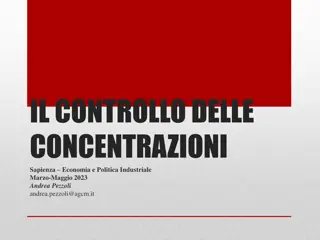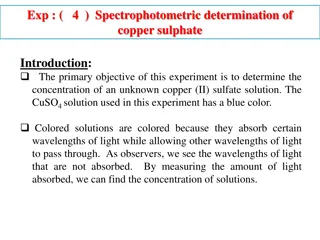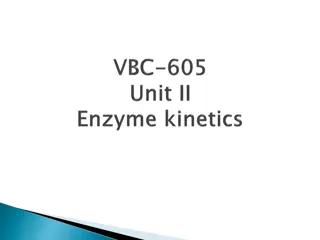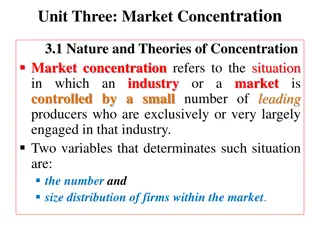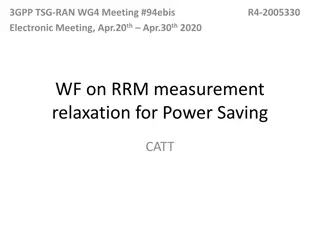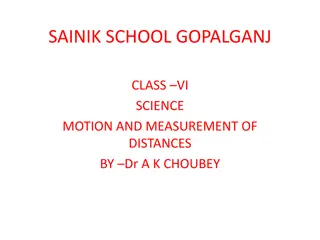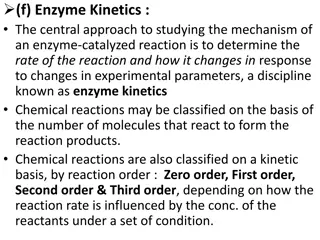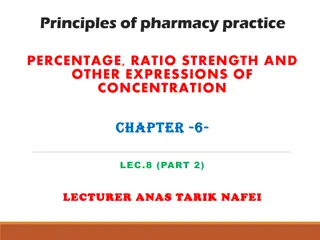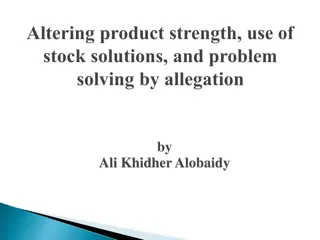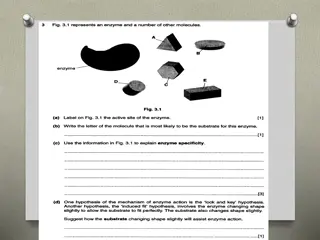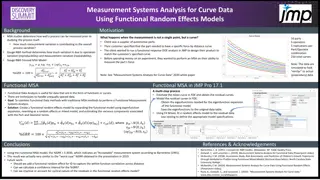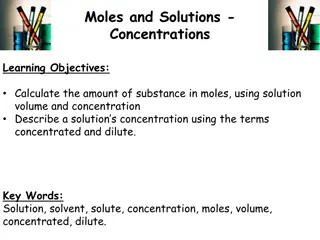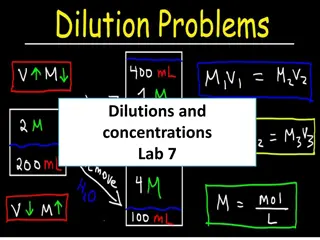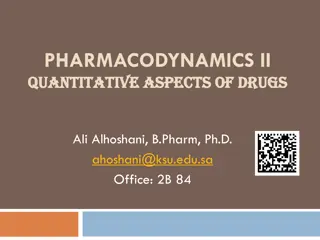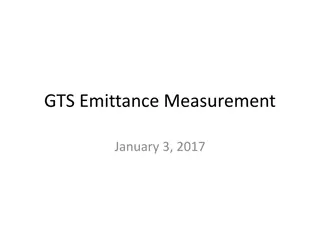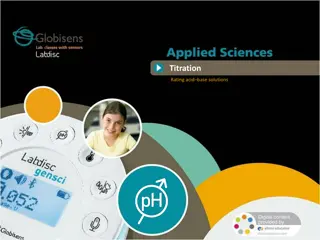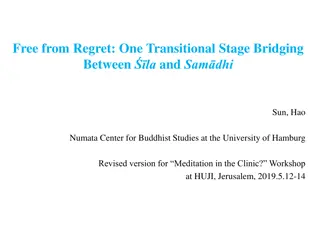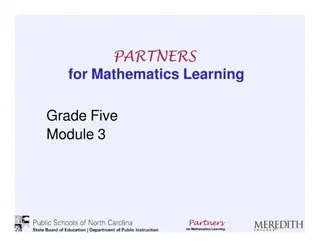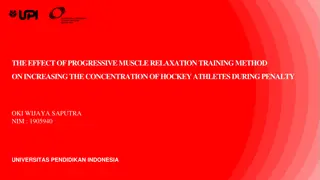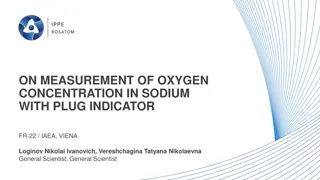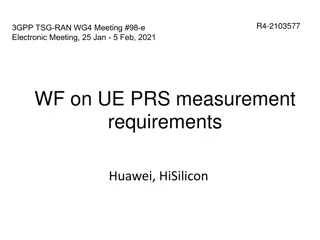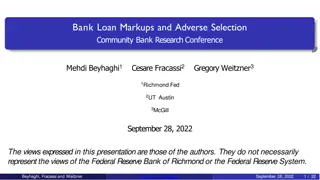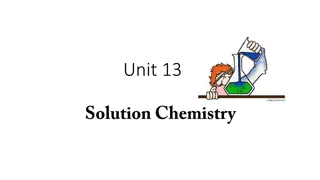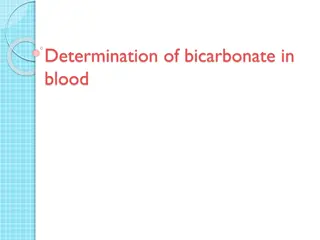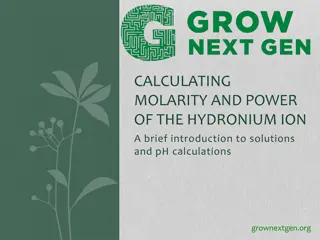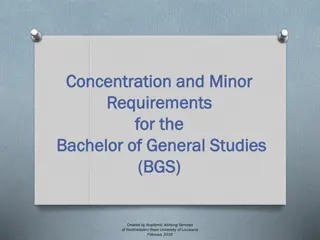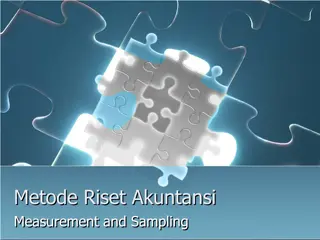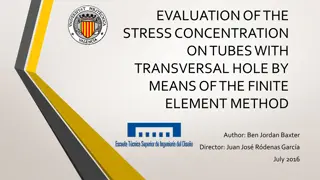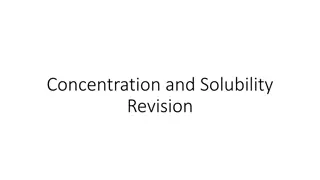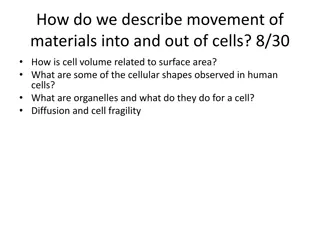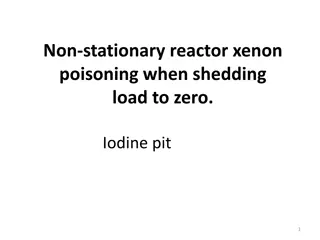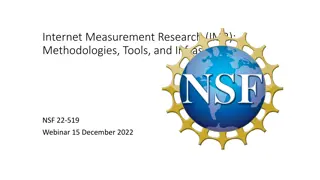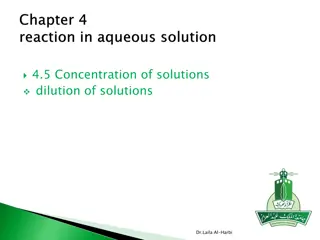Concentration Control in Economics and Industrial Policy
Explore the topic of concentration control in economics and industrial policy, covering recent developments, horizontal and non-horizontal mergers, market power of digital platforms, post-merger evaluations, and calls for stricter merger regulations. Empirical evidence indicates a rise in market con
1 views • 75 slides
Spectrophotometric Determination of Copper Sulfate Concentration
The experiment aims to determine the concentration of an unknown copper (II) sulfate solution by measuring light absorption at different wavelengths. Colored solutions absorb specific light wavelengths and appear colored to our eyes. By creating a calibration curve and following Beer's Law, the conc
3 views • 8 slides
Understanding Measurement Scales and Scaling Techniques
Measurement scales play a crucial role in marketing research, with techniques like scaling helping to categorize data. The content discusses four types of measurement scales: nominal, ordinal, interval, and ratio, outlining their characteristics and differences. Scaling techniques involve placing re
5 views • 7 slides
Understanding Water Potential and Solute Concentration in Biological Systems
Explore the concept of water potential and solute concentration in cells through diagrams and equations. Learn about hypertonic, hypotonic, and isotonic solutions, and how water movement is affected by solute concentration differences. Discover how adding solutes affects water potential and the dire
0 views • 19 slides
Factors Affecting Enzyme Activity and Catalysis
Enzyme activity is influenced by various factors such as enzyme concentration, temperature, pH, substrate concentration, inhibitors, activators, and physical agents. The rate of enzyme-catalyzed reactions is directly proportional to enzyme concentration, and temperature plays a significant role with
0 views • 23 slides
Understanding Market Concentration and Its Implications
Market concentration refers to industries controlled by a small number of leading producers, impacting pricing and output decisions. Various theories, measurement methods, and implications on firm behavior and performance are discussed, highlighting the relationship between monopoly power and market
0 views • 62 slides
RRM Measurement Relaxation for UE Power Saving in 3GPP Meeting #94ebis
This document discusses methods for relaxing RRM measurements to save power in UE devices during idle/inactive states. It covers scenarios with low mobility, non-cell edge, and combinations, suggesting options like longer measurement intervals and relaxing neighbor cell measurement requirements. The
0 views • 7 slides
Understanding Motion and Measurement of Distances in Science at Sainik School Gopalganj
Explore the concepts of motion and measurement of distances in science as taught by Dr. A.K. Choubey at Sainik School Gopalganj. Discover the development of means of transport, different measurement methods like non-standard and standard measures, the significance of measurement, and the Internation
1 views • 16 slides
Understanding Temperature Effects on Donor and Acceptor Ionization in Semiconductors
Temperature plays a crucial role in the ionization of donor and acceptor atoms in semiconductors. In N-type semiconductors, the Fermi level lies below the conduction band, while in P-type semiconductors it lies above the valence band, with the position depending on temperature and impurity atoms. Do
1 views • 13 slides
Exploring Enzyme Kinetics for Understanding Chemical Reactions
Enzyme kinetics is a vital discipline focusing on the rate of enzyme-catalyzed reactions and how they respond to varying conditions. Reactions are classified based on reactant concentration influences. Zero, first, second, and third order reactions are distinguished, with examples like first-order r
0 views • 31 slides
Pharmacy Concentration Expressions Explained
Learn about percentage, ratio strength, and other expressions of concentration in pharmacy practice. Explore how to convert between different concentration units with examples and understand parts per million and parts per billion measurements.
0 views • 17 slides
Understanding Kinetics and Reaction Rates in Chemistry
Kinetics is the study of reaction rates and factors affecting them, such as concentration, temperature, catalysts, and more. Orders of reaction classify reactions based on rate dependency on reactant concentration. Factors like pH, light, and solvents can also impact reaction rates. Half-life and sh
0 views • 18 slides
Understanding Pharmaceutical Preparations: Strength and Concentration
Pharmaceutical preparations can have their strength and concentration adjusted by changing the proportion of active ingredients. This process involves increasing or decreasing the active ingredient, adding diluents, admixing with other preparations, or evaporating the vehicle. Dilution of liquid, so
0 views • 34 slides
Factors Affecting Enzyme Activity and Kinetics Experiments
Explore the factors influencing enzyme activity, such as substrate and enzyme concentration, temperature, pH, and inhibitors. Learn how to simulate enzyme kinetics using equipment like popping beads and stopwatches. Analyze results to understand the impact of substrate concentration on reaction rate
0 views • 22 slides
Functional Measurement Systems Analysis for Curve Data Using Random Effects Models
Measurement Systems Analysis (MSA) is crucial in determining the contribution of measurement variation to overall process variation. When dealing with curve data instead of single points, a Functional MSA approach using random effects models can be applied. This involves estimating mean curves, mode
0 views • 5 slides
Understanding Concentration in Solutions
Solutions involve the dissolution of solutes like salt or sugar in solvents such as water, resulting in different concentrations. This concentration can be expressed as moles per liter, known as molarity. By calculating the amount of substance in moles using solution volume and concentration, you ca
0 views • 8 slides
Understanding Dilutions and Concentrations in Lab Experiments
Dilution and concentration are key concepts in laboratory experiments where solutions of different concentrations are adjusted to achieve specific concentrations. The process involves diluting high concentration solutions with suitable diluents or concentrating low concentration solutions by various
0 views • 15 slides
Understanding Quantitative Aspects of Drug Action
Explore the quantitative aspects of drug action, including drug receptor binding, concentration binding curves, dose-response curves, and types of antagonism. Learn to relate drug concentration to receptor binding capacity and response produced. Discover how concentration binding curves and dose-res
0 views • 29 slides
Understanding Measurement and Instruments in Research
Exploring the significance of instruments in research, this content delves into the development and utilization of measures for concepts like caring. It covers the various devices used to measure constructs, the rules governing measurement assignment, direct versus indirect measurement methods, and
2 views • 64 slides
Emittance Measurement Techniques and Analysis
Various emittance measurement techniques like Solenoid and Viewscreen, Single Slit and Viewscreen are discussed in this document along with details on the measurement process, equipment setup, and data analysis methods. Emittance calculations, beamlet intensity profiles, and space-charge dominated b
0 views • 11 slides
Enhancing Memory and Concentration Techniques for Academic Success
Explore the fascinating world of memory and concentration through various techniques and processes highlighted in the provided images. Discover how sensory memory, short-term memory, and long-term memory function, along with tips on improving concentration, learning strategies, and the interplay bet
1 views • 34 slides
Understanding Acid-Base Titration in Chemistry
Acid-base titration is a quantitative technique used to determine the concentration of unknown acids or bases. Through neutralization reactions, the concentration of a solution can be calculated based on the stoichiometry of the reaction. This method dates back to the late 18th century and is crucia
0 views • 24 slides
Free from Regret: Transitional Stage in Buddhist Concentration Practice
Exploring the transitional stage between la and Samdhi Sun, this workshop delves into the multiple prerequisites for Buddhist concentration (samdhi) and the shared inner states that foster concentration. By overcoming the Five Hindrances, practitioners can achieve joy, rapture, tranquility, and ulti
0 views • 22 slides
Exploring Measurement Challenges and Concepts in Grade Five Mathematics
Delve into a variety of measurement challenges in Grade Five mathematics, including different units, common errors, measurement components, big ideas, accuracy, precision, and the measurement process. Understand the nuances between accuracy and precision, factors affecting measurement accuracy, and
0 views • 39 slides
The Impact of Progressive Muscle Relaxation Training on Hockey Athletes' Concentration During Penalties
Concentration is crucial for athletes, especially during penalties in hockey. Progressive Muscle Relaxation training can enhance concentration by requiring players to focus while relaxing. This study aims to investigate the effectiveness of PMR on improving hockey athletes' concentration during pena
0 views • 12 slides
Measurement of Oxygen Concentration in Sodium with Plug Indicator FR-22
Determining oxygen concentration in sodium using plug indicators is crucial for experimental facilities and nuclear reactors. This involves lowering sodium temperature slowly until sodium oxide crystallization begins, indicating saturation temperature (TS). Several solubility equations exist for cal
0 views • 6 slides
UE PRS Measurement Requirements Discussion at 3GPP TSG-RAN WG4 Meeting #98-e
Discussion at the 3GPP TSG-RAN WG4 Meeting #98-e focused on UE PRS measurement requirements. The topics included consideration of muting in measurement periods, periodicity scaling for PRS resources, handling different resource periodicities, and offsets in measurement periods. Various options were
0 views • 18 slides
Bank Loan Markups and Adverse Selection: Market Concentration Analysis
This research presentation by Beyhaghi, Fracassi, and Weitzner explores the impact of market concentration on bank loan markups and adverse selection. It delves into how asymmetric information across lenders influences interest rates in local banking markets, shedding light on the relationship betwe
0 views • 44 slides
Understanding Solution Concentration in Chemistry
Solutions in chemistry are homogeneous mixtures of two or more substances where each maintains its own chemical identity. They consist of a solute, the substance being dissolved, and a solvent, the substance used to dissolve the solute. Solution concentration can be described qualitatively as concen
0 views • 17 slides
Determination of Bicarbonate in Blood Using Back Titration
Back titration is an analytical chemistry technique used to determine the concentration of an analyte, such as bicarbonate in blood. This method involves reacting the analyte with an excess reagent, followed by back-titrating the remaining excess and relating it to the original sample's concentratio
0 views • 21 slides
Understanding Solution Concentration and pH Calculations
Explore the concepts of solution concentration, specifically molarity calculations, and pH measurements related to the power of the Hydronium ion. Learn how to calculate molarity, determine the Hydrogen/Hydronium ion concentration, and understand the pH scale from acidic to basic. Practice sample pr
0 views • 13 slides
Concentration and Minor Requirements for Bachelor of General Studies (BGS)
Bachelor of General Studies (BGS) students at Northwestern State University of Louisiana must complete a concentration consisting of 36 hours, with a minimum of 12 hours at the 3000 and 4000 levels taken at NSU. The popular concentrations are Social Science, Computer & Natural Science, and Arts & Co
0 views • 9 slides
Understanding Accounting Research Methods: Measurement and Sampling
Measurement is a crucial aspect of research in accounting. It involves assigning numbers to empirical events, objects, or properties. Measurement consists of selecting measurable phenomena, developing mapping rules, and applying these rules appropriately. The process of measurement includes determin
0 views • 63 slides
Evaluation of Stress Concentration on Tubes with Transversal Hole
Study on evaluating stress concentration on tubes with transversal holes using the finite element method. The research aims to understand the stress concentration factor evolution to develop a generalized equation. Various load cases and criteria analyses were performed, debunking assumptions about
0 views • 12 slides
Understanding Concentration and Solubility in Solutions
This content covers topics related to concentration and solubility in solutions, including calculating concentration, determining solubility, and comparing different solution properties based on concentration levels. It also includes examples and explanations to help understand these concepts better
0 views • 6 slides
Understanding Cellular Transport and Concentration in Biology
Explore the movement of materials into and out of cells, the relationship between cell volume and surface area, various cellular shapes observed in human cells, the functions of organelles, diffusion, cell fragility, units of concentration measurement, regulation of movement across plasma membranes,
0 views • 20 slides
Reactor Xenon Poisoning and Iodine Pit Phenomenon
When a non-stationary reactor is shut down or its load is reduced to zero, xenon poisoning occurs due to the disruption of dynamic equilibrium between the increase and decrease of 135Xe. This leads to a temporary increase in 135Xe concentration, followed by a decrease as it decays. The reactivity ma
0 views • 58 slides
Advancing Internet Measurement Research: IMR Program Overview
The Internet Measurement Research (IMR) program aims to enhance Internet measurement methodologies, tools, and infrastructure for a comprehensive understanding of wired and wireless networks. It promotes the development of new data collection methods, measurement tools, and related infrastructure. T
0 views • 23 slides
Understanding Cloud Droplet Concentration in Marine Stratocumulus Clouds
Analysis of cloud droplet concentration's impact on aerosol indirect effects and cloud morphology transitions in marine stratocumulus clouds. Observations on drizzle-CCN coupling, MODIS estimation of cloud droplet concentration, and prevalence of drizzle in low clouds. Insights on CCN budget in the
0 views • 30 slides
Understanding Concentration and Dilution of Solutions by Dr. Laila Al-Harbi
Dr. Laila Al-Harbi explains the concept of concentration of solutions, focusing on molarity and the calculation involved. The molar concentration of solutions is determined by the amount of solute in a given volume of solvent, expressed as moles of solute per liter of solution. Additionally, the pro
0 views • 15 slides
